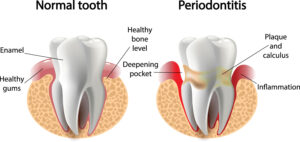
For people who golf, their score reflects how many strokes it took to go from the tee box to the flag, and drop into the hole. While a high number seems to be a good thing in many goals, having a low number and being as close to ‘par’ (typically a 72) after 18 holes is where a golfer strives. Low is good.
There are other things where a low number is a good thing. Dental cleanings are among those.
In our Shelby Twp dental office, we hope our patients look forward to their periodic dental check-ups (generally every 6 months). Although we understand that not everyone can attest a sense of enjoyment when it comes to these cleanings and exams, they are truly an integral part of the health of your teeth and gums.
During these visits, the dental hygienist is able to evaluate the condition of your gums. Although people tend to focus on their teeth in thoughts of a “smile’s health,” the gums play a significant role in the well-being of your oral health. This has never been more clear than results of research that has tracked the path of oral bacteria once it leaves the mouth.
Gum disease affects over 80% of the population at some time in their life. Research has shown that the bacteria of periodontal (gum) disease can enter the bloodstream through weakened gum tissues. Once in the bloodstream the bacteria have been found to trigger inflammatory reactions that can activate or worsen serious diseases. These include coronary artery disease, stroke, high blood pressure, diabetes, arthritis, some cancers, and erectile dysfunction.
When you realize that this same destructive bacteria is born and bred in the mouth, it becomes easier to understand its drastic destruction in the mouth. These potent bacteria are able to form colonies at the base of teeth and bore into tooth enamel. They multiply rapidly and accumulate at the base of teeth, forming tartar.
As the bacteria move below the gumline, they can destroy bone and tissues that support tooth roots. Teeth become loose as the disease progresses and may eventually require removal. In the U.S., gum disease is the leading cause of adult tooth loss.
This is easily avoided with a thorough at-home oral hygiene regimen and twice-a-year dental check-ups. An important part of these check-ups is monitoring the periodontal seal around the base of each tooth.
Your hygienist uses a periodontal probe, which is a thin instrument with a blunted end. It has markings that measure the ‘pocket depth’ of gums. Using light pressure, the hygienist places the probe’s tip around the gum tissue between each tooth and at the front and back sides.
The depth of the periodontal pockets around teeth is the main indicator for the presence and progression of gum disease and level of tissue destruction. Periodontal probing is how dentists evaluate the severity of periodontal disease. Probing is also endorsed by the World Health Organization (WHO).
During the probing process, you’ll likely hear the Hygienist call out numbers as she probes different points around each tooth. These are recorded in your patient chart. Hearing a ‘one’ or ‘two’ is an indication of healthy gums. Measured depths of ‘three’ and over indicate the presence of gum disease. When gum disease is classified at depths of 3 to 5, mild periodontal disease has begun. Five to 6 indicates moderate periodontitis and over 6 or 7 is severe periodontitis.
These measurements determine the level gum disease present as well as the treatment needed. Anything over a ‘3’ or ‘4’ level typically requires a deeper level of ‘cleaning,’ known as scaling and root planing. This treatment allows the hygienist to reach the bacteria beneath the gumline, removing it and restoring the gums to a healthy state.
It’s important to be aware of the signs and symptoms of gum disease, which include:
• Red or swollen gums
• Gums that may bleed when brushing teeth
• Persistent bad breath or unpleasant taste in the mouth
• Gums that pull away from the base of teeth
• Sensitive teeth
• Loose teeth
Gum disease will not resolve on its own and will worsen as bacteria continue to amass. Our Macomb County dental office is known for supporting patients in the prevention of gum disease. We do this by helping patients to be proactive in their care so they can enjoy a healthy, confident smile and support their overall health simultaneously.
Your at-home care is very important. Brushing at least twice a day (at least two minutes each time), daily flossing and limiting sugar are helpful in managing bacterial levels in the mouth. Also, drink plenty of water throughout the day to keep the mouth moist. Limit coffee, tea and colas. This is because caffeine is very drying to oral tissues, as is alcohol. If you smoke (whether cigarettes or vaping), you’ll need added measures to keep a healthy smile. Our dental hygienists will gladly offer tips to minimize the damage of nicotine.
As a Macomb and Oakland County dentist, I can assure you that our goal is to help patients avoid the need for dental repairs and procedures for a lifetime of confident smiles. Our Shelby Township dental office is always happy to welcome new patients. We offer complete dental services, advanced skills and technology, and comfort options including Oral and I.V. Sedation (“twilight sleep”).
For a no-cost, private consultation, call 586-739-2155 or tap here to begin. You are also invited to get to know us through a brief video: DrBarbatIntro